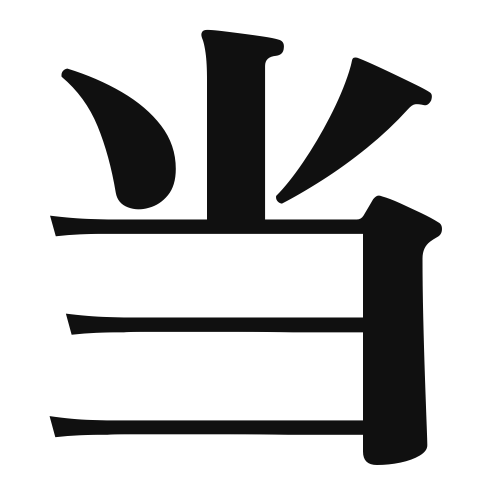1. Overview of Meaning
The kanji “当” (pronounced “tou” or “atari”) generally means “to hit,” “to be appropriate,” or “to be in charge.” It conveys the idea of something being correct or suitable in a given context.
2. Formation and Radical
Formation of the Kanji: The kanji “当” is a compound character that combines elements to convey its meaning. It is formed from the radical “竹” (bamboo) and the phonetic component “当,” which suggests a connection to hitting or striking.
Radical: The radical of “当” is “竹,” which is often associated with things related to bamboo, but in this case, it contributes to the overall meaning of the character.
3. Examples of Usage
Common Words and Phrases: Some frequently used words that include “当” are:
- 当たり前 (atarimae) – obvious, natural
- 当選 (tousen) – winning (a lottery, election, etc.)
- 当日 (toujitsu) – the day in question
Example Sentences in Daily Conversation:
- それは当たり前のことです。 (Sore wa atarimae no koto desu.) – That is an obvious thing.
- 彼は選挙で当選しました。 (Kare wa senkyo de tousen shimashita.) – He won the election.
4. Synonyms and Antonyms
Similar Kanji: A kanji with a similar meaning is “適” (teki), which means “suitable” or “appropriate.” While both convey a sense of appropriateness, “当” often implies correctness in a more direct sense.
Opposite Kanji: An antonym for “当” is “外” (gai), which means “outside” or “external,” indicating something that is not appropriate or fitting in a given context.
5. Cultural and Historical Background
Relation to Japanese Culture: The kanji “当” is often used in various cultural contexts, such as in traditional games and practices where hitting a target is essential.
Proverbs and Idioms: One common expression is “当たって砕けろ” (atatte kudakero), which translates to “hit and break,” meaning to take a chance or to go for it despite the risks.
